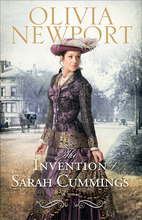 Set in 1890's Chicago, Olivia Newport's The Invention of Sarah Cummings follows a young parlor maid as she invents for herself a role in upper class society. Orphaned as a child and sent into service as a teenager, Sarah has become an accomplished seamstress but longs for a life of ease. In a spur of the moment decision, Sarah invents for herself a new name - Serena Cuthbert - along with a full, affluent past to sneak her way into society and a wealthy marriage. However, her new life still has to be sandwiched in between her duties as a maid and her obligation to teach sewing classes for the girls at the orphanage where she grew up, and it becomes harder and harder to keep her servile life secret from her friends and beau in society.
Set in 1890's Chicago, Olivia Newport's The Invention of Sarah Cummings follows a young parlor maid as she invents for herself a role in upper class society. Orphaned as a child and sent into service as a teenager, Sarah has become an accomplished seamstress but longs for a life of ease. In a spur of the moment decision, Sarah invents for herself a new name - Serena Cuthbert - along with a full, affluent past to sneak her way into society and a wealthy marriage. However, her new life still has to be sandwiched in between her duties as a maid and her obligation to teach sewing classes for the girls at the orphanage where she grew up, and it becomes harder and harder to keep her servile life secret from her friends and beau in society. I do not completely dislike Sarah, but due to her choices and the motives behind them, it is also hard to actually like her. If there were anything noble about her deception, it would be easier, but it is purely for her own personal gain that she passes herself off as a socialite. Creating, owning, and wearing fancy dresses is acceptable; creating a false life with the full intention of perpetuating it through marriage is not. I also had a hard time understanding her fantasy - she can appear to be a wealthy lady by her dress and talk, but the moment they find out the truth, where will she be? Back to being just a maid, quite possibly sacked, and likely branded a liar. In the city where she was born and raised, where acquaintances abound, there is too miniscule a chance of pulling off her deception even long enough to become engaged, let alone marry.
Newport writes an incredibly rich historical novel, in which clearly a significant amount of research was involved. Invention involves a lot of the political history of the time, including the William McKinley vs William Jennings Bryan debates and presidential election, at a time when America was moving toward leaving the gold standard for currency. Her take on the upstairs-downstairs roles is also well written, and in spite of Sarah's blurred view of the lines, it is still clearly a very real divide - the wealthy can choose to "work" by occasionally helping with charities, but they are not friends with nor do they marry those of the working class. Newport's appreciation for the perfection involved in service comes through in Sarah's tendency to notice the hard work of other servants while she is pretending to be Serena Cuthbert.
The novel was not exactly what I had anticipated. Having never read any of Newport's novels before, I was expecting something a little more lighthearted and romantic, based on the title and description; this, however, is decidedly on the reserved side, with a greater emphasis on the history than the romance. Since the relationship between Sarah and Simon is not a strong focus of the book, it seems a bit rushed in the end when Sara is finally willing to take a chance on him. Also, I am uncertain as to whether or not she learns anything spiritually; she learns to accept herself and chooses to make things right with Simon, but I do not feel she is any closer to God personally at the end of the book than at the beginning. Given that, along with how difficult it was to care for the main character, I give this book 3 stars. While it is the third book of a series, I had no problem following the story. I would still like to read the first two novels of the series, though, as I liked the writing style and strong historical basis.
I received a free e-copy of this novel from Revell via Netgalley for the purpose of review; all opinions expressed are my own, and I was not required to make my review positive.
Avenue of Dreams
The Pursuit of Lucy Banning
The Dilemma of Charlotte Farrow
The Invention of Sarah Cummings
No comments:
Post a Comment